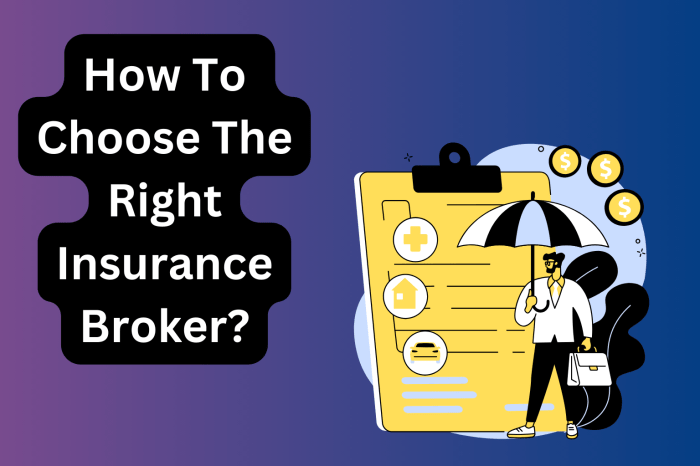When it comes to selecting the right insurance brokers for corporate accounts, various factors play a crucial role in making the best decision. From evaluating criteria to researching potential brokers, this guide delves into the intricate process of finding the perfect match for your corporate insurance needs.
Factors to Consider when Selecting Insurance Brokers for Corporate Accounts

When choosing insurance brokers for corporate accounts, it is crucial to consider several factors to ensure that you are making the right decision for your company's insurance needs.Reputation and Experience:
Importance of Reputation and Experience
Insurance brokers with a strong reputation and extensive experience in the industry are more likely to provide high-quality services and tailored solutions for corporate accounts. A broker's reputation can give you insight into their track record of success and client satisfaction.
Additionally, experienced brokers are better equipped to navigate complex insurance requirements and negotiate favorable terms for corporate clients.Expertise in Handling Corporate Insurance Needs:
Significance of Expertise in Handling Corporate Insurance Needs
Corporate insurance needs can be unique and diverse, requiring specialized knowledge and understanding of industry-specific risks. When selecting insurance brokers for corporate accounts, it is essential to choose professionals who have expertise in handling complex insurance portfolios and can offer customized solutions to address your company's specific needs.
An experienced broker with industry-specific knowledge can provide valuable insights and recommendations to help you make informed decisions and mitigate risks effectively.
Researching Potential Insurance Brokers
When it comes to choosing the right insurance broker for your corporate accounts, thorough research is essential. Here are the steps involved in researching different insurance brokers:
Compare and Contrast Services Offered
- Begin by identifying the specific insurance needs of your corporate accounts.
- Research and compile a list of potential insurance brokers who specialize in corporate accounts.
- Review the services offered by each broker, paying close attention to coverage options, pricing, and customer support.
- Consider the reputation of each broker by looking up reviews and ratings from other corporate clients.
- Request quotes from the brokers to compare costs and coverage options.
Key Resources for Gathering Information
- Utilize online resources such as insurance broker directories and websites to find a list of potential brokers.
- Seek recommendations from other businesses in your industry who have experience working with insurance brokers.
- Consult with industry associations or trade organizations for referrals to reputable insurance brokers.
- Check with your state insurance department to ensure that the brokers you are considering are properly licensed and in good standing.
Evaluating Broker Credentials and Licenses

When it comes to choosing insurance brokers for corporate accounts, verifying their credentials and licenses is crucial. This ensures that you are working with professionals who have the necessary qualifications to handle your company's insurance needs effectively.
Importance of Verifying Broker Credentials
- Check for valid licenses: Ensure that the insurance broker holds a valid license from the relevant regulatory authority. This demonstrates that they have met the required standards and can legally operate as a broker.
- Professional certifications: Look for brokers who have professional certifications, such as Chartered Insurance Professional (CIP) or Certified Insurance Broker (CIB). These certifications indicate a higher level of expertise and professionalism.
- Experience and expertise: Consider the broker's experience in handling corporate accounts and their knowledge of the specific industry your company operates in. A broker with relevant experience can provide tailored insurance solutions.
Confirming Legitimacy of Broker Qualifications
- Request copies of licenses and certifications: Ask the broker to provide copies of their licenses and certifications for verification.
- Check with regulatory bodies: Contact the regulatory bodies overseeing insurance brokers in your region to confirm the broker's credentials and ensure they are in good standing.
- Review online databases: Some regulatory bodies have online databases where you can search for licensed insurance brokers and verify their qualifications.
Regulatory Bodies Overseeing Insurance Brokers
Some of the regulatory bodies that oversee insurance brokers include the Financial Industry Regulatory Authority (FINRA) in the United States, the Financial Conduct Authority (FCA) in the United Kingdom, and the Insurance Regulatory Authority of India (IRDAI).
Understanding Brokerage Fees and Compensation Structures
When it comes to insurance brokers for corporate accounts, understanding the different types of fees and compensation structures is crucial. This knowledge can help you make informed decisions and ensure transparency in your business dealings.
Types of Fees Associated with Insurance Brokers
Insurance brokers may charge various types of fees for their services. Some common fees include:
- Commission-based fees: Brokers earn a commission from insurance companies for selling their products.
- Fee-based fees: Brokers charge a flat fee or hourly rate for their services, regardless of the insurance product purchased.
- Contingency fees: Brokers receive additional compensation based on the performance of the insurance policies they sell.
Common Compensation Structures in the Insurance Industry
In the insurance industry, compensation structures can vary based on the type of product being sold and the broker's relationship with insurance companies. Some common compensation structures include:
- Percentage-based commissions: Brokers earn a percentage of the premium paid by the client for the insurance policy.
- Flat fees: Brokers charge a fixed amount for their services, regardless of the size or type of insurance policy.
- Profit-sharing agreements: Brokers receive a share of the profits generated by the insurance company from the policies sold.
Examples of Fee Structures and Impact on Corporate Accounts
For corporate accounts, the choice of fee structure can have a significant impact on overall costs and the quality of insurance coverage. For example, a commission-based fee structure may lead to higher premiums for the client, as brokers are incentivized to sell policies with higher commissions.
On the other hand, a fee-based structure may offer more transparency and lower costs, especially for large corporate accounts with significant insurance needs.
Assessing Broker Communication and Customer Service
When selecting insurance brokers for corporate accounts, assessing their communication and customer service capabilities is crucial. A strong client-broker relationship relies heavily on effective communication and exceptional service. Here are some key points to consider:
Evaluating Responsiveness and Availability
- Look for brokers who promptly respond to inquiries and are easily reachable through various communication channels such as phone, email, or in-person meetings.
- Assess their ability to provide timely updates on insurance policies, claims, and any changes that may affect the corporate account.
- Consider their availability to address any urgent matters or provide assistance during critical situations.
Importance of Client-Broker Relationship
- A strong client-broker relationship fosters trust, transparency, and effective collaboration, leading to better risk management and tailored insurance solutions for corporate accounts.
- Clear and open communication between the broker and the client ensures that all insurance needs are understood and met efficiently.
- Good customer service enhances the overall experience for corporate clients, making them feel valued and supported throughout their insurance journey.
End of Discussion
In conclusion, choosing insurance brokers for corporate accounts requires careful consideration and thorough research to ensure the best outcomes for your company. By focusing on reputation, expertise, credentials, and communication, you can navigate the selection process with confidence and make informed decisions that benefit your corporate accounts in the long run.
Popular Questions
What are the key factors to consider when selecting insurance brokers for corporate accounts?
Important criteria include reputation, experience, and expertise in handling corporate insurance needs.
How can I research potential insurance brokers effectively?
You can research by comparing services, gathering information from key resources, and evaluating their credentials and licenses.
What is the significance of assessing broker communication and customer service?
Communication and customer service play a vital role in establishing a strong client-broker relationship, crucial for corporate accounts.



